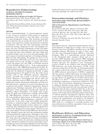 July 2024 in “ADMET & DMPK”
July 2024 in “ADMET & DMPK” Surface-modified nanostructured lipid carriers can improve hair growth treatments.

Nanocarriers with plant extracts show promise for safe and effective hair growth treatment.
 34 citations,
March 2003 in “Veterinary Dermatology”
34 citations,
March 2003 in “Veterinary Dermatology” Most dogs with alopecia had higher than normal levels of certain hormones, but hair loss might not always be linked to these hormone changes.
 January 2024 in “Women's health science journal”
January 2024 in “Women's health science journal” Hormonal imbalances are a key cause of missed menstrual periods in women.
 26 citations,
April 2019 in “Journal of Cosmetic Dermatology”
26 citations,
April 2019 in “Journal of Cosmetic Dermatology” Herbal alternatives like saw palmetto and green tea may offer safe, effective treatment for hormonal hair loss.
 4 citations,
January 2019 in “PubMed”
4 citations,
January 2019 in “PubMed” Patterned hair loss in women is linked to hormonal imbalances and biochemical changes, and should be evaluated for underlying health issues.
 7 citations,
January 2022 in “Animal Reproduction”
7 citations,
January 2022 in “Animal Reproduction” Using rodents for research shows that health problems in the womb can cause diseases later in life.
 September 2018 in “Journal of the American Academy of Dermatology”
September 2018 in “Journal of the American Academy of Dermatology” Elderly patients with CCCA were all African American with low vitamin D, but no iron or zinc deficiencies, and no hormonal imbalances compared to younger patients.
 2 citations,
March 2001 in “Environmental Health Perspectives”
2 citations,
March 2001 in “Environmental Health Perspectives” Small hormonal imbalances can cause significant health problems, so more sensitive testing for hormone-disrupting chemicals is needed.
 1 citations,
April 2018 in “Revista da Sociedade Portuguesa de Dermatologia e Venereologia”
1 citations,
April 2018 in “Revista da Sociedade Portuguesa de Dermatologia e Venereologia” Hidradenitis suppurativa is a chronic skin condition more common in women, linked to genetics and lifestyle factors, and associated with various other health issues.
 46 citations,
January 1996 in “Journal of The American Academy of Dermatology”
46 citations,
January 1996 in “Journal of The American Academy of Dermatology” People with late-stage HIV-1 often experience a specific type of hair loss linked to multiple factors, including nutritional issues and immune responses.
 April 2020 in “Journal of the Endocrine Society”
April 2020 in “Journal of the Endocrine Society” A woman's severe hirsutism was caused by Leydig cell tumors in her ovaries, which improved after surgery.

Early-onset baldness is linked to genetics, lifestyle, and can indicate higher risk for heart and metabolic diseases, and affects mental health.
 1 citations,
February 2020 in “Cureus”
1 citations,
February 2020 in “Cureus” Women with PCOS are more likely to have skin problems like excessive hair, acne, and hair loss.
 43 citations,
July 1984 in “Clinical and Experimental Dermatology”
43 citations,
July 1984 in “Clinical and Experimental Dermatology” Antiandrogen therapy helped increase hair growth in women with hormonal imbalances related to baldness.
October 2022 in “International Journal of Research in Dermatology” Hormonal imbalances contribute to female hair loss, and trichoscopy is a useful diagnostic tool.
 24 citations,
November 2016 in “Molecular Medicine Reports”
24 citations,
November 2016 in “Molecular Medicine Reports” Hormonal imbalances, often indicating conditions like PCOS, are common in women with hard-to-treat acne, and a treatment approach addressing these imbalances may be needed.
 October 2021 in “Turkderm”
October 2021 in “Turkderm” Hormonal imbalances, not insulin resistance or dyslipidemia, may be more important in causing acne in women over 25.
 December 2023 in “International Journal of Research in Dermatology”
December 2023 in “International Journal of Research in Dermatology” Hormonal imbalances are important in the development of male pattern baldness.
 21 citations,
May 2005 in “Journal of the American Veterinary Medical Association”
21 citations,
May 2005 in “Journal of the American Veterinary Medical Association” The exact cause of growth hormone-responsive alopecia in dogs is unclear.
 8 citations,
January 1996 in “Springer eBooks”
8 citations,
January 1996 in “Springer eBooks” Male pattern baldness may be caused by factors like poor blood circulation, scalp tension, stress, and hormonal imbalances, but the exact causes are still unclear.
 June 2013 in “Expert Review of Dermatology”
June 2013 in “Expert Review of Dermatology” The article concludes that hormonal therapy is an effective long-term acne treatment, even for those without hormonal imbalances.
1 citations,
December 2019 in “Frontiers in endocrinology” Higher androgen levels during puberty are linked to shorter adult height in boys with Silver-Russell syndrome.
3 citations,
January 2017 in “Gynecological endocrinology” A postmenopausal woman's excess male hormone symptoms were caused by a rare adrenal gland tissue in her ovary.
 December 2024 in “Eastern Medical College Journal”
December 2024 in “Eastern Medical College Journal” Acne and PCOS are linked due to hormonal imbalances and metabolic issues.
 12 citations,
July 2020 in “DOAJ (DOAJ: Directory of Open Access Journals)”
12 citations,
July 2020 in “DOAJ (DOAJ: Directory of Open Access Journals)” Men with hormonal imbalances similar to PCOS may have increased risk of metabolic and heart diseases.
 25 citations,
January 2022 in “Endocrine journal”
25 citations,
January 2022 in “Endocrine journal” Long COVID patients may have hormonal imbalances linked to their symptoms.
 16 citations,
September 2008 in “Dermatologic Therapy”
16 citations,
September 2008 in “Dermatologic Therapy” CAH is a genetic disorder affecting cortisol production and causing hormonal imbalances, with treatment and diagnosis varying by form and symptoms.
2 citations,
January 1986 in “PubMed” Spironolactone improved symptoms in women with hormonal imbalances and had few side effects.

Many women with postadolescent acne also have hormonal imbalances and are at higher risk for metabolic issues.


























